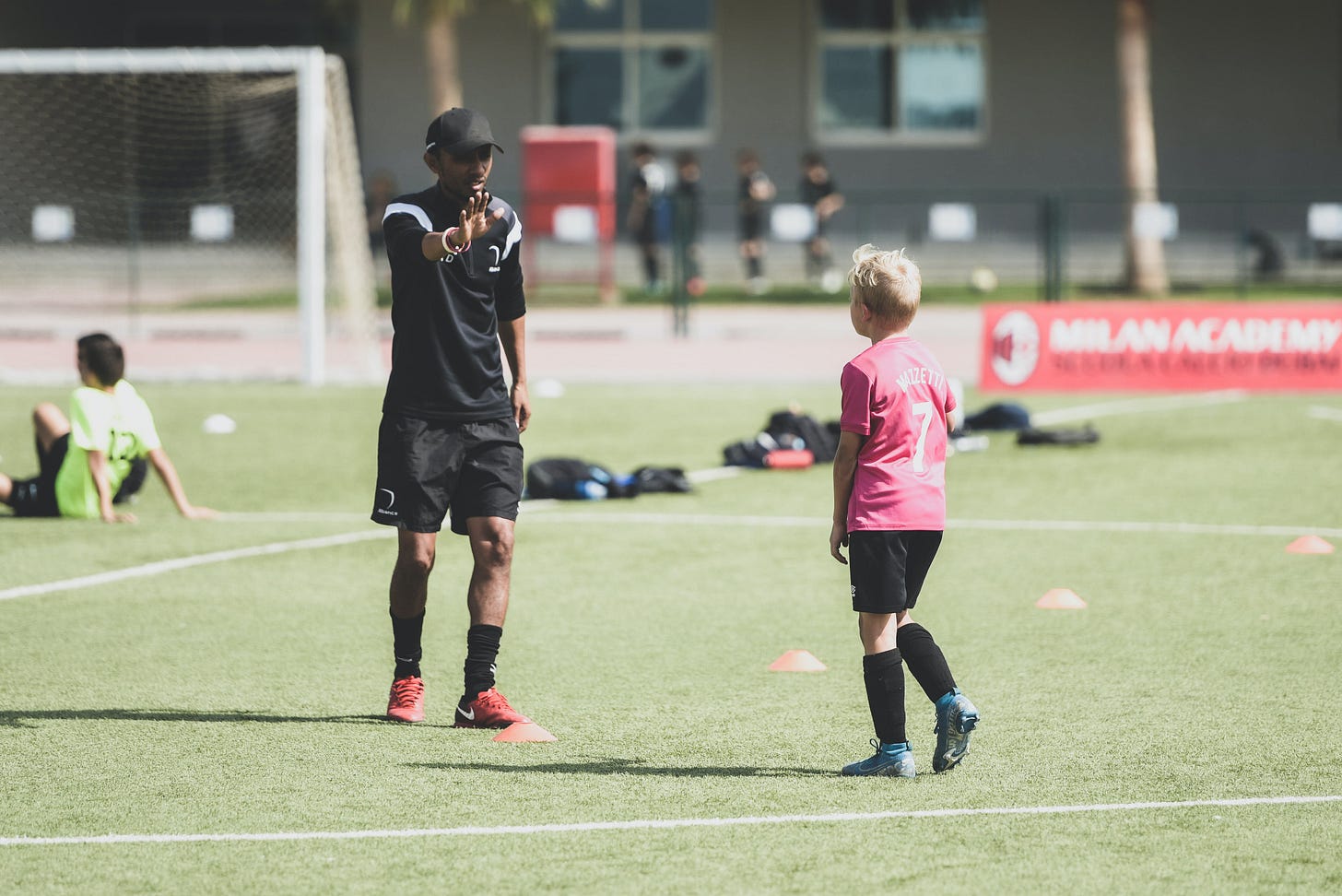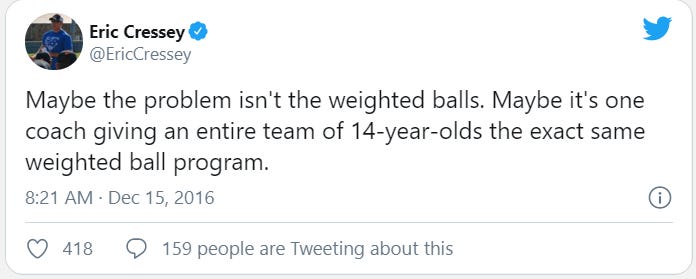Are We Teaching Athletes Skills That Translate to Improvement?
A disturbing trend is growing in coaching which is teaching our athletes skills that do not translate well to performance improvement. Let's explore.
Every Sunday I publish an email on leadership and human performance called The Physical Movement. While the intent was to create a resource for coaches, athletes and parents, it has generated interest from all walks of life. Thank you.
You can subscribe to be first in line every Sunday here:
“Practice. We are talking about practice?” - Allen Iverson.
In 2021, developing as a young athlete means hiring a skills coach more often than not.
With this influx of structured coaching sessions, there is also a growth of a variety of coaching styles and philosophies.
There is no need to have 1 specific approach or philosophy. What works in developing one person, may differ from another.
However, there is a growing trend of young athletes being coached in ways that do not translate well to performance improvement.
Governing bodies are providing more than ever before to standardize some fundamental skill development best practices and progressions to improve and maintain coaching relevance.

When we move to the privatization of coaching, that is where a much of the discrepancy starts to creep in. Is privatization turning coaching into the wild, wild west? Is it limited to privatization or are the standards lax in community sports as well?
The growth of privatized coaching: In 2020, the sports coaching industry was an $8 billion business, according to the market research group IBISWorld. From 2012 to 2017 this industry, composed of more than 130,000 businesses, experienced 3 percent annual growth. The sports coaching field is expected to continue performing well in the years to come due to increased participation in sports for health benefits as well as to offset the high cost of college tuition through sports scholarships. Sports camps and academies are growing as parents seek sports coaches and programs to help their children stay active and improve their likelihood of receiving sports scholarships. (reference here).
This does not mean privatized coaching is bad, not at all the point here. In fact, coaching as a business gives a viable outlet for some very good coaches to make a living helping others. The point is that it is also business and should be evaluated with that consideration as well as qualifications and experience of the coaching personnel.
The goal of hiring a skills coach is to help young athletes get better, but WHAT are they being taught?
If Mom or Dad are providing the instruction, what qualifications do they have to ensure the skills being taught are positive and productive?
Are the drills being taught going to assist with the making our young athlete better?
What question should parents ask?
When does skills practice become an activity to keep the kids busy as opposed to building their skill set so they can continue to improve and enjoy?
How do you as a family evaluate the level of instruction provided?
The philosophy of the program?
The monitoring of progress?
Does the coaching style and approach increase the risk of injury? (We often assume not, but practice certain skills without proper progressions is more harmful that good.)
There is no better example of all of this around the topic of using weighted balls for velocity training in baseball. There is lots of documentation on the benefits and also now on the injury risk of using this training method. Using them or not depends on the athlete, the coaching philosophy, assessment and progression.
More details on the topic in our PLAY. LEAD. BE STRONG section below.
Jeff Frye is a former Major League Baseball Player who’s commentary on social media around self -proclaimed coaching gurus has received a lot of traction. Evaluating the merit of certain drills and standards are important in thinking critically about WHAT is being done to develop athletes.
Topics Jeff covers include drills as per below all the way to the monetization of “elite development leagues”.

There is no better example of were instruction without proper qualifications and experience can do damage is in the world of strength and conditioning. Young athletes don’t just get stronger by playing anymore, they do so with the help of strength and conditioning programs. While that inherently is not bad, getting hurt in the gym is obviously not the goal.
As with the example of the weighted balls in baseball, developing strength must follow science and proven research in terms of what progressions are safe and can be built upon. In my personal experience, I have seen some pretty outlandish programming around strength development in youth sports.
In September of 2020, The Physical Movement addressed the role of the strength and conditioning coach as one that is poorly understood by most parents and many coaches.
We covered the evolution of the strength coach, the difference between the strength coach and personal trainer, the dangers of improper strength and conditioning as well as benefits to individuals and teams that use them.
TPM also provides 7 considerations in choosing the right strength and conditioning coach:
· The first area to consider are your goals.
· The 2nd are your needs. Injury prevention? Better movement and performance? Both?
· The 3rd is the age of the athlete. A younger athlete program will need to be different than one in their teens or early 20s.
· Sustainability. Find a program or coach that is sustainable for the athlete, the family and/or you as an organization. One of the biggest mistakes made in choosing a program or coach is short sightedness. Athletic development is not a short term gig, quite the opposite it requires a long game mentality.
· Experience. What experience does the coach have working with athletes at that age group? Can you see them in action before you make their choice? Is there evidence of credibility, qualifications and good references?
· Connection and communication. Is there an ease of communication with the coach?
You can see the full article on the role of the strength and conditioning coach here.
Bottom line.
The same considerations outlined here can be adapted and applied in choosing any type of individual skills coach. In a team setting, organizations should have some transparency on criteria in selecting coaches. Qualifications? Experience? Philosophy?
More Than Hard Work Required.
One most over simplified phrases in athlete development is that hard work is all that’s required for improvement. We know that is not the only variable. While practice and hard work is critical, practicing the RIGHT things that will translate well to the playing field are just as important.
Coaches help our athletes work on the things that will allow them to get better. By practicing what will get them better improves confidence, and confident athletes are high performing athletes.
A recent article on Montreal Canadiens rookie Jake Evans highlights the value of being coached on the approach and skills that translate well to game situations. Evans was a low draft pick and his development was gradual and sparked by a coach who clearly understood the pre-requisites to be effective at the next level. Being coached on the skills that translate, in addition to hard work and the personality traits required to accept the coaching are all outlined here in this success story.
PLAY. LEAD. BE STRONG:
Additional resources on weighted balls and velocity improvement in baseball here:
Coach Tom House has been coaching throwing for a long time. This article is the best I have found in putting the topic and best practices in context along with the research to support it.
Weighted balls: History, Holds and How-Tos:
https://teammstrd.com/the-squeeze/weighted-balls-why-we-do-holds/
Additional real good articles on the topic
https://elitebaseballperformance.com/are-weighted-baseball-velocity-programs-safe-and-effective/
https://mikereinold.com/why-weighted-baseballs-increase-pitching-velocity-and-injury-rates/








